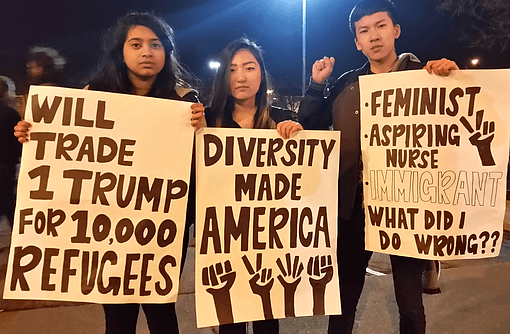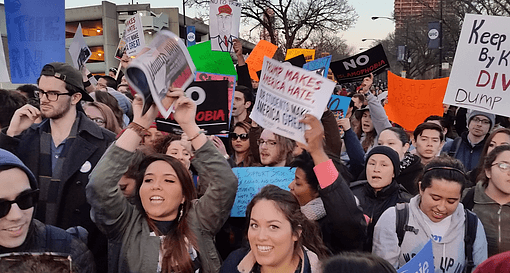
The people of Chicago are reviving an old tradition. Young people here, particularly blacks and Latinos, have re-learned a lesson about how real change is made and they are teaching the rest of us:
We have power in the streets that we don’t possess in the electoral arena. We can fight and we can win. And using this approach, on Friday night in the course of a few hours, several thousand Chicagoans did more to stop Trump bigotry than months of media blather and politicians’ handwringing.
The protesters’ boldness has roots in recent struggles against our infamously vicious, pro-1% mayor. Shutting down half of the city’s mental health clinics, attacking teachers and public education while diverting funds to charter schools, giving millions of tax dollars to wealthy real estate developers while illegally harassing the homeless and starving public services, particularly the schools, of funding.
But it was the cover-up of a police dashcam video showing a cop murdering 18-year-old Laquan McDonald, while several others casually looked on, that caused the protests to reach a qualitatively higher level. Gone was any fealty to Chicago’s notorious anti-protester laws, bad to begin with, but made much worse in the run-up to the 2012 NATO conference in the city. Activists in other cities with such seemingly unmovable laws, please take note.

For weeks, Chicagoans poured into the streets — sans permits — blocking the city’s busiest thoroughfares during rush hour and shutting down Michigan Avenue’s posh boutiques and high-end stores on the most profitable shopping days of the holiday season.
The militancy rid the city of a hated police superintendent; it gave the sitting mayor unprecedented low approval ratings; and it has forced the county’s supinely pro-cop state’s attorney into a fight for her political life.
So it is no accident that it was in Chicago that Donald Trump first got his just desserts. After taking on an authoritarian Democratic Party machine in Chicago, why not take on arch-bully and Republican thug, Donald Trump? And that’s just what happened on Friday!
Chicago’s response last Friday to Trump was not simply fresh and exciting. It also charts a far more effective path to getting real change than the quadrennial “choice” of picking the least worst next president.
Since Trump declared his candidacy, the media has provided tons of free publicity to his anti-immigrant, sexist, ablist and Islamophobic hate. And politicians in both parties have no principled response to his out-front bigotry — their policies and statements often mimic his own, just without the bombast and ranting.
Just consider Obama’s record number of deportations—something that has earned him the bitterly mocking title, “Deporter-in-Chief,” by millions of angry Latino voters who supported him in 2008 and 2012. Or consider the baldly Islamophobic statements Hillary Clinton and her Republican opponents have routinely made over the past few months. Or consider Bernie Sanders’ long and torturous equivocations when pointedly asked whether he thought Trump was a racist.
Thousands of Chicagoans demonstrated last Friday that the 99%’s main strength is in the streets, not at the ballot box. It’s there, in the streets, that change happens; the ballot box at best only ratifies that change.
But the “street heat” made on Friday shouldn’t stop with Chicago. It needs to be replicated elsewhere. If it is, it could herald the beginning of the end of Trump’s presidential campaign.
He’s built his reputation on being a bully and a thug, and the hate he spews attracts those of like mind to him. But there is a lesson that the movements of oppressed people here and elsewhere, from the civil rights movement to the women’s movement to the gay rights movement, have taught us:
Bullies lose face and their support melts away when they are successfully confronted by their victims.
Trump was the recipient of that lesson last Friday night in Chicago. He needs to be a recipient of the same lesson wherever he goes in this country.